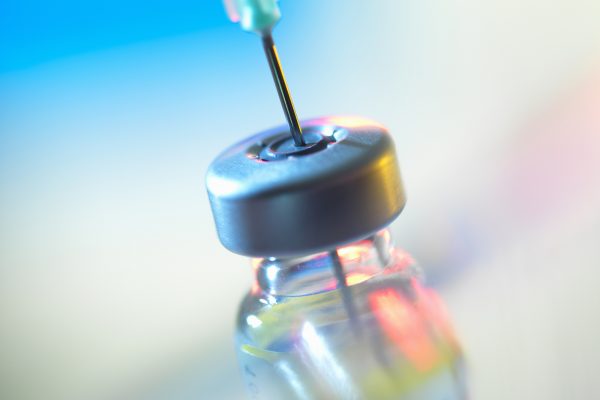
Until now, the antibody responses after SARS-CoV-2 vaccination in patients with non-Hodgkin lymphoma, including chronic lymphocytic leukaemia (NHL/CLL) were incompletely characterised. This study shows that antibody binding and neutralisation against SARS-CoV-2 in NHL/CLL patients who received two mRNA vaccine doses are substantially lower than those in healthy vaccinees. Importantly, anti-CD20-directed therapy one year before vaccination and number of circulating B-cells strongly predicted vaccine response.
Patients with haematologic malignancies, especially those with non-Hodgkin lymphoma (NHL), including chronic lymphocytic leukaemia/small lymphocytic lymphoma (CLL/SLL), collectively NHL/CLL, are at increased risk of morbidity and mortality after infection with SARS-CoV-2. Immunosuppressed individuals, including patients with NHL/CLL, can also have persistent COVID-19 disease, which can facilitate the emergence of SARS-CoV-2 variants. The global spread of multiple SARS-CoV-2 variants is a topic of great concern. Therefore, to protect the vulnerable cancer patient population, vaccination against SARS-CoV-2 is strongly recommended for these patients. mRNA vaccines BNT162b2 (Pfizer) and mRNA-1273 (Moderna) generate potent antibody responses in the general population. However, their antibody responses after vaccination have been incompletely characterised for NHL/CLL patients. This study examined the binding and live-virus neutralising antibody responses elicited after two mRNA vaccine doses against SARS-CoV-2 and its variants of concern, including B.1.167.2 (Delta) and B.1.1.529 (Omicron), in patients with NHL/CLL.
Blood samples from patients with NHL/CLL and healthy volunteers who received two doses of vaccine were collected longitudinally. Samples from pre-pandemic NHL/CLL controls were also collected. Of the blood sample, 50 µl was removed for whole blood staining. The remaining sample was immediately processed to separate PBMCs and plasma, which were frozen in liquid nitrogen and at -80˚C, respectively, until the time of use. Clinical data, including patient demographics, lymphoma diagnosis, and treatment course, were collected from the patient’s electronic medical records. Antibody binding titters against SARS-CoV-2 spike, SARS-CoV-2 spike N-terminal domain (NTD), SARS-CoV-2 spike receptor-binding domain (RBD), SARS-CoV-2 nucleocapsid, and the spike proteins of SARS-CoV-2 variants of concern were measured using a multiplex plate coated with these proteins. Live-virus neutralisation against Delta, Omicron, and the early WA1/2020 strains was measured using a focus reduction neutralisation test. B-cells were measured by flow cytometry. Correlation between vaccine response and clinical factors was determined.
A total of 121 patients with NHL/CLL and 45 healthy controls who received two doses of vaccine were enrolled. Measurements from 41 NHL/CLL patient samples obtained before February 2020 were used as negative controls. IgG seroconversion after two doses of vaccine was 67.3% in nucleocapsid-negative patients with NHL/CLL vs. 100% of healthy vaccinees. Patients with NHL/CLL showed 85-, 62-, and 46-fold reductions in mean IgG-binding titres against full-length spike, RBD, and NTD, respectively, compared with healthy vaccinees. Anti-SARS-CoV-2 spike IgG-binding titres significantly increased after the second vaccine dose and slowly decreased over time. Peak antibody response and mean antibody levels in patients with NHL/CLL, however, remained significantly lower than in healthy vaccinees. Alarmingly, between 29.6% and 52.9% of patients showed no seroconversion at any given time point. After performing a live-virus focus neutralisation test (FRNT) in a subset of patients, it was shown that only 68% of NHL/CLL patients vs. 100% of controls developed neutralising antibodies. Patients with NHL/CLL who received anti-CD20-directed therapies within one year before initial vaccination showed the most profound impairment in response, with 136-fold reduction in IgG titres vs. treatment-naive patients with NHL/CLL. At three months from the last anti-CD20-directed therapy, B-cell numbers were significantly associated with seroconversion, particularly for patients with ≥ 4.31 B-cells/L. Antibody responses also correlated with age. Patients aged >65 years had 10-fold lower antibody titres compared with patients age ≤ 65 years (p= 0.0016). Neutralisation titres against Delta and Omicron variants were significantly reduced among patients with NHL/CLL who completed two doses of mRNA vaccine, regardless of prior SARS-CoV-2 infection. Importantly, neutralisation titres against Delta and Omicron were reduced 6- and 42-fold, respectively, with 67% of patients seropositive for WA1/2020 exhibiting seronegativity for Omicron.
Antibody binding and live-virus neutralisation against SARS-CoV-2 and its variants of concern, including Delta and Omicron, were substantially lower in NHL/CLL patients who received two mRNA vaccine doses vs. healthy vaccinees. Anti-CD20-directed therapy one year before vaccination and number of circulating B-cells strongly predict vaccine response. This study reinforces the need to optimise vaccine responses through booster doses, to continue public health mitigation strategies, and to prioritise antiviral agents and prophylactic antibody therapy to protect this highly immunosuppressed population.
Reference